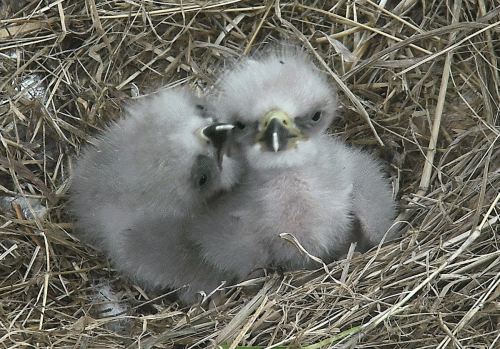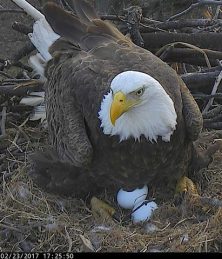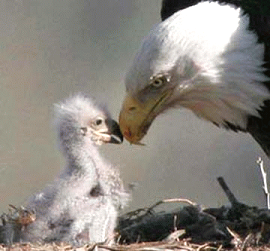Eagle Cam Shows Baby Eagles…

Breaking News! DC Eagle Cam Reveals Two Baby Eaglets
BREAKING NEWS UPDATE: “The Eaglets Have Landed! A day after its sibling hatched, a second eaglet in the National Arboretum’s eagle nest began breaking free of its shell.” – American Eagle Foundation.
And so it began. Great news. Great for a number of reasons.
Only decades ago, the American Bald Eagle was an Endangered Species. If not for the passionate work of people like American wildlife artist Charles Livingston Bull, the majestic bird would have disappeared from the continental US.
Today, the Bald Eagle is making a triumphant comeback. Bolstered by a number of breeding pairs resettled from Canada. Especially from Cape Breton, Nova Scotia, where the big birds have always been protected. The iconic raptor is again sailing the blue skies as a free creature.
It’s been absolutely amazing watching one eagle’s nest on the now-famous DC Eagle Cam.
It began with one egg beginning to open! “Breaking” News…
“Since New Years Eve millions of viewers have tuned into the DC Eagle Cam (dceaglecam.org) to watch two live‑streaming, high-definition cameras featuring the wild nest of Bald Eagles Mr. President & The First Lady.
 “For the past month and more, these parents have been faithfully incubating two eggs in their nest. The nest is at the top of a Tulip Poplar tree in the U.S. National Arboretum, right inside the Nation’s Capitol.
“For the past month and more, these parents have been faithfully incubating two eggs in their nest. The nest is at the top of a Tulip Poplar tree in the U.S. National Arboretum, right inside the Nation’s Capitol.
“Their devoted attention and dedicated efforts finally began to pay off this morning. One of the soon-to-be-eaglets has now begun the hatching process!
“During incubation, an eaglet develops an ‘egg-tooth’ on the tip of its upper beak, which is used to crack holes in its eggshell from the inside. The first hole made in the shell is called a pip.”
American Eagle Foundation (AEF) volunteer camera operators first witnessed this first small crack on the egg around 9:58 a.m. EDT, March 28.
“As of now, the crack appears to be less than the size of a dime. It could take anywhere from 12‑48 hours for an eaglet to fully emerge, or hatch, from its shell.
“This is a very special time in the nest,” says AEF Founder & President Al Cecere. “To witness the up‑close process of an eaglet breaking through its shell is wonderfully heartwarming. We hope both eaglets hatch this week and show signs of good health.”
This first egg was laid on February 19. The second was laid on February 23 and cam viewers are hopeful that it will also begin to hatch in a few days. The first baby bald eagle. The average incubation period for an eagle egg is 35 days.
These will have been the fourth and fifth eaglets raised by these parents at this idyllic location. In the AEF’s educational chatroom (where viewers can create an account and talk to experienced moderators and other “chatters”) this eaglet will be tentatively referred to as “DC4.” If and when its sibling hatches, it will tentatively be called “DC5.”
In several weeks, the general public will have the opportunity to help come up with official names for these eaglets.
Conclusion: Fascinating, isn’t it? It’s not only fun, there’s a fundamental feeling of belonging to all of Nature, watching this nesting eagle pair and their eaglets. Egg-citing, eh?
“Live Free, Mon Ami!” – Brian Alan Burhoe
Did you enjoy this wildlife post?

IF SO, YOU’LL LOVE “WOLFBLOOD” — MY MOST POPULAR ANIMAL STORY:
“I JUST READ WOLFBLOOD AGAIN FOR GOOD MEASURE. ONE FOR ANY WOLF LOVER. ENJOYED IT BUT WISH IT WAS A FULL LENGTH NOVEL.” – Gina Chronowicz @ginachron
“GREAT SHORT STORY! DOES REMIND ME OF CALL OF THE WILD, WHITE FANG…” – Evelyn @evelyn_m_k
WOLFBLOOD, a thrilling Northwoods adventure in the Jack London Tradition, FREE TO READ ==> WOLFBLOOD: A Wild Wolf, A Half-Wild Husky & A Wily Old Trapper
ABOUT THE D.C. EAGLE CAM PROJECT:
In 2015, the American Eagle Foundation (AEF) staff traveled to D.C. to install state-of-the-art cameras, infrared lighting, and other related equipment in-and-around the nest tree. All with the help of volunteers and experienced tree arborists and climbers.
This past year, the AEF added microphones near the nest to further enhance the viewing experience. And a team of arborists and eagle experts affixed natural tree limbs beneath the nest to provide added support.
The USDA’s U.S. National Arboretum ran a half-mile of fiber optic cable to the cameras’ ground control station, which connects the cameras and microphones to the Internet.
The entire Eagle Cam system is powered by a large mobile solar array (containing several deep cycle batteries) that was designed and built by students and staff from Alfred State College, SUNY College of Technology.
And was partially funded by the Department of Energy and Environment. USNA has implemented a backup generator that will kick-on if prolonged inclement weather causes the solar array to provide insufficient power to the system.
In 2016, APEX Electric Inc. (Kenmore, Washington) traveled to D.C. to assist the AEF in successfully installing audio equipment in and around the tree.
The AEF uses Piksel to stream the video images to viewers around the world, and AEF volunteers are trained and coordinated to pan, tilt and zoom the cams, as well as educate the public via LIVE chats while viewers watch the eagles via the cams on the Internet.
How long do baby eagles stay in the nest?
Around ten to fourteen weeks, the eaglets will fledge, or fly away from, the nest. Once the eaglets have fledged they may remain around the nest for four or five weeks, taking short flights while their primary feathers grow and strengthen. Their parents will still provide all of their food.
Learn more at http://www.eagles.org.
SOURCE: American Eagle Foundation, PR Newswire & Civilized Bears.
TAGS: American bald eagles, American Eagle Foundation, Charles Livingston Bull, DC eagle cam, eagle eggs, eaglets hatch, endangered species, wilderness, wildlife.













